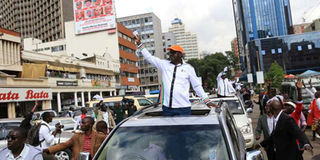Involve all the parties to give Kenya effective electoral reforms

Cord leaders Raila Odinga, Kalonzo Musyoka and Moses Wetangula lead demonstrations against IEBC on May 23, 2016 along Koinange Street, Nairobi. PHOTO | JEFF ANGOTE | NATION MEDIA GROUP
What you need to know:
- With the contested election in 2007 that led to the post-election violence, the country must have an electoral referee that enjoys the confidence of all the players.
- One of the biggest failures of the ongoing demonstrations is that they lack inclusivity.
- The IEBC debate has now been reduced to a personal contest between the Cord team, the commissioners, and politicians affiliated to the ruling coalition.
The ongoing debate on whether or not or how the commissioners of the Independent Electoral and Boundaries Commission should leave office is taking a rather dangerous path.
There is no doubt that with the contested election in 2007 that led to the post-election violence still fresh in our minds, the country must have an electoral referee that enjoys the confidence of all the players.
Although the law has put in place clear mechanisms of removing the officials of independent commissions, where IEBC falls, the ongoing debate has now reached a point where a political rather than a legal process should take precedence in guiding the solution to the conflict.
However, the two antagonistic sides have failed to treat this delicate matter with the care it deserves. The Jubilee side is arrogant while Cord is clearly out of strategy on how to effect the desired results.
One of the biggest failures of the ongoing demonstrations, which Cord says are constitutionally granted and the only remaining practical way to push the government to act, is that they lack inclusivity.
There are many other players such as the church, other political groupings, professionals, and organised civil groups that would have easily been brought on board to give the clamour more civic legitimacy.
The IEBC debate has now been reduced to a personal contest between the Cord team, the commissioners, and politicians affiliated to the ruling coalition. We must not forget that political reforms are given credence and legitimacy by the civic voice and action.
Although most of the civic organisations have their own weaknesses and cannot pass the impartiality test, they can easily give the ongoing debate a voice of reason.
For instance, the narrative of the sin of the commissions or omissions of the current commissioners that now render IEBC incapable of impartiality have not been brought to the fore, a role that an independent player can play.
And we have precedents. When former president Daniel Moi gave in and allowed multi-party elections in 1991, comprehensive constitutional and electoral reforms were not conceded.
UNFAIR PLAYING GROUND
An unfair playing ground that was compounded by a divided opposition saw Mr Moi win the elections in 1992. But in the 1997 elections, with serious lobbying and pressure that was brought to bear by a combination of civil society and political parties, with the former legitimising the process and the latter serving as a mobilising force, Mr Moi, who had strongly resisted any constitutional reforms before the elections, conceded to a political process.
The Inter-Parties Parliamentary Group was initiated and it was agreed that there be minimum reforms before the elections. This saved the country from going into anarchy. Although the divided opposition could not secure a victory, the electoral process and its outcome were accepted.
The removal of the commissioners is not an end in itself. The issue and process of setting up another electoral body is also more of a political than a legal process, making it crucial that politicians make concessions.
However, it is dangerous to leave the process only to politicians, whose past contests have left the country divided. The voice of the public must find a place in this process.
The head of State should initiate constructive consultations with all the players. He should then appoint a competent panel to oversee the recruitment of a new credible electoral body, as prescribed in Article 250 and the Independent Electoral and Boundaries Commission Act of 2011. The panel should enjoy the confidence of all the players and Kenyans, and should be vetted by Parliament.
The current commissioners of the IEBC should be impressed upon to resign to pave the way for the search for their replacements.
This seems inevitable since the politicians have irreparably poisoned the environment for them to conduct any credible election, yet the poll is approaching and there is little time left to fix things.
Mr Obonyo is the author of Conversations About the Youth in Kenya. [email protected].





